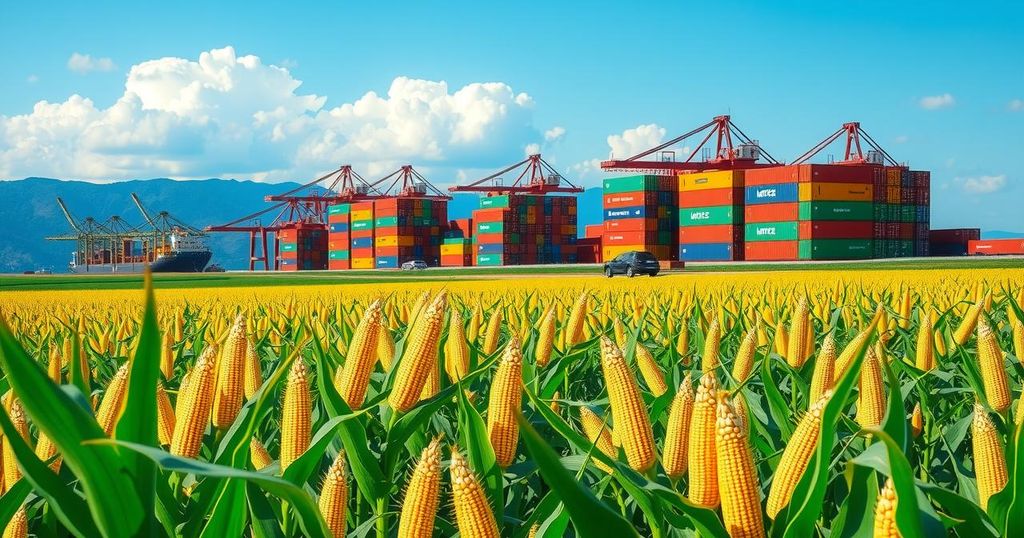Politics
ADMINISTRATIVE DEPARTMENT OF STATISTICS, ASIA, CHINA, COLOMBIA, CUBA, DANE, EXPORTS, GUSTAVO PETRO, HEMISPHERE, INTERNATIONAL TRADE, LATIN AMERICA, MEXICO, NATIONAL ADMINISTRATIVE DEPARTMENT OF STATISTICS, NORTH AMERICA, PET, SOUTH AMERICA, TPA, TRADE, TRADE RELATIONS, UNITED STATES, US, WASHINGTON, WESTERN HEMISPHERE
Dante Raeburn
The Significance of US-Colombia Trade Amid Rising Chinese Influence
The United States and Colombia share a crucial trade partnership characterized by a $1.3 billion trade surplus in 2024. The US-Colombia Trade Promotion Agreement has benefitted US agricultural producers, with Colombia being a key market. However, increased Chinese imports pose challenges, necessitating cooperation between the two nations to secure mutual economic interests.
The longstanding partnership between Colombia and the United States has evolved over decades, focusing on migration, security, counternarcotics, and trade, resulting in a US trade surplus with Colombia of $1.3 billion in 2024. This relationship is critical for US agricultural producers, as Colombia has emerged as the top destination for US agricultural exports in South America, supported by the US-Colombia Trade Promotion Agreement (TPA). Despite ongoing economic and political challenges, the United States retains its status as Colombia’s primary trading partner with a total of $36.7 billion in bilateral trade, though recent data indicate a rise in Chinese imports.
The evolving dynamics of trade were brought into sharper focus by recent tensions related to Colombian President Gustavo Petro’s handling of domestic issues that have negatively impacted bilateral relations. While his administration initially resisted cooperating with the United States on critical issues, including migration, subsequent concessions indicate a willingness to recalibrate the relationship. As Colombia’s National Administrative Department of Statistics revealed an uptick in Chinese imports surpassing US goods, the potential for the United States to lose market ground to China in South America becomes increasingly concerning.
The value of Colombian imports such as crude oil, coffee, and other commodities is significant; however, the greater importance lies in Colombia’s market for US exports. The United States has maintained a trade surplus due in part to flourishing US agricultural exports, particularly yellow corn, which has transformed Colombia’s livestock and fishing industries. The TPA has allowed US producers to provide Colombian markets with competitively priced quality products, fulfilling local needs that cannot be met domestically. This sector’s reliance on US inputs suggests that any deterioration of trade relations could adversely affect both economies.
Numerous other agricultural exports, including soybeans, wheat, and fruits, amount to nearly $3 billion annually and are at risk should trade relations worsen. Although the political landscape may complicate bilateral ties, the overall commercial interests of both nations in security and economic cooperation remain paramount. It is crucial for those involved in US policy-making to be cautious about renegotiating the TPA, which could unintentionally empower critics like President Petro, resulting in unintended consequences for US exporters.
Despite potential governmental frictions, the private sector has a pivotal role in mitigating tensions between the two nations. With valuable export markets available to American agricultural producers, any trade disputes would represent significant risks not only for Colombia but also for key US states involved in agricultural production. Fortunately, diplomatic channels may provide the necessary leverage to maintain steady relations, ensuring both countries can uphold mutual economic interests and prevent escalation into a trade war.
The United States and Colombia have nurtured a beneficial trade relationship, integral to both nations’ economies despite recent political complications. The TPA has facilitated significant agricultural exports, notably yellow corn, enhancing food security in Colombia while providing consistent revenue for US producers. Preserving this trade framework is essential amidst competitive pressures from China; by fostering diplomatic cooperation, both countries can safeguard their economic interests.
Original Source: www.atlanticcouncil.org








Post Comment